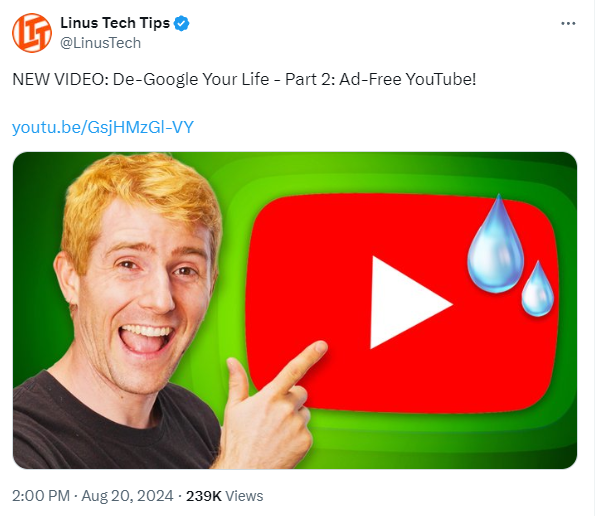https://files.catbox.moe/a6111d.png / https://nitter.poast.org/LinusTech/status/1825956050685800834

If you go the video, https://www.youtube.com/watch?v=GsjHMzGl-VY. You will see it’s gone. So Youtube being Youtube.
Here’s a Odysee mirror of the video, https://odysee.com/@jopec:7/linus-tech-tips-degoogle-your-life-part-2-adfree-youtube:0.


It’s really not. YouTube doesn’t get to decide what I play on my browser, I do. I just choose to not load the ads, and I choose to skip over sponsor segments manually. I don’t use sponsor block or anything automated like that, I just use a content blocker and the fast-forward buttons YouTube provides.
At what point did I pirate anything? I asked YouTube for content, and it gave it to me. I didn’t ask it for the ads, and it didn’t give it to me. I fail to see where the piracy occurred.
I’m certainly breaking their TOS, but that doesn’t necessarily mean I’m pirating their content.
If I find value in a platform, I’ll pay. I pay for Nebula, for example, because I’ve gotten a lot of value from a number of their creators and prefer to watch their content there than on YouTube. I’ll occasionally buy merch from a YouTuber, and sometimes donate. But YouTube actively tracks me in ways I’m not comfortable with, so I block their trackers and their ads.
…So, you skip the ads using an external program, which prevents the youtube channel you’re watching from getting their money.
That’s the part that makes it piracy. Of course you have the right to do this, I have no ethical problem with it, i’m doing it now, but you have to understand that when you’re doing this you’re preventing the youtube channels you’re watching from getting paid, you’re taking their content without paying them what they asked for in return.
If the youtube channel disables the ads themselves, that’s one thing, but you not watching those ads is not what the youtube channels want… because that’s how they get paid. Getting free content without paying the content maker is… piracy.
There’s no external program, it’s just an extension on my browser, which uses APIs within the browser to instruct it which content to load and which not to load. I tell it to block all kinds of things, from malware to large media elements to ads. YouTube doesn’t get to decide what content it displays in my browser, I do, because it’s my computer.
Yes, I’m preventing channels from getting ad-revenue, but that doesn’t make it piracy. What we call “piracy” is more correctly called “copyright infringement.” I’m not violating anyone’s copyright, the video is freely available to load and watch, I’m just choosing to not load and watch the optional extras that get shipped along with the video. I’m violating YouTube’s TOS, but that doesn’t mean I’m violating copyright in any way, and I don’t even need to login to YouTube to do this either, so it’s not like I formally agreed to anything here.
What the channels want isn’t my concern. If they want to enforce payment, LTT can post the videos to floatplane exclusively, or join up with Nebula.
That’s absolutely not true. Piracy is copyright infringement, and I’m not infringing anyone’s copyright here.
Here are examples of things that would be piracy/copyright infringement:
Each of those violates copyright because I’m sharing the video with people I am not authorized to share it with. Just watching the content and refusing to load the ads doesn’t violate anyone’s copyright, it just violates YouTube’s TOS, which, AFAIK, isn’t legally binding in any way. They can choose to block me from the platform, but not loading optional extras doesn’t violate any copyright.
Your copyright license to download the video content from YouTube is granted to you by the YouTube Terms of Service. By not agreeing to them, you do not get a license to watch the content.
Copyright law may be dumb and over-reaching but that doesn’t mean you get to redefine it to just avoid an icky word.
If that was true, I would have to agree to YouTube’s TOS to watch videos. That’s not required, so there’s no legally binding agreement between me and YouTube since I haven’t actually signed or accepted anything. My understanding is, I’m not bound to something that’s hidden in a link somewhere and never presented to me.
But even if I were legally bound to the TOS, nothing in the TOS says copyright is granted on the condition that I watch ads. This is the closest that I could see:
I don’t think blocking ads counts as “disable… any part of the Service,” it’s just blocking certain web requests. It’s close I guess, but it seems they’re more worried about “hacks” on the service to get access to things you’re not supposed to. For example, accessing adult content w/o making an account would probably count as a violation under this TOS.
Honestly you’re just showing your complete lack of knowledge on the topic. Using your logic, downloading a pirated movie and watching it myself, then immediately deleting it, is not copyright infringement.
Despite the fact that it literally is.
Not according to German, French, and I suspect most of other european countries laws. Only torrenting copyright-protected content is against the law because you’re uploading the content (distributing) while downloading.
I can torrent without seeding btw
deleted by creator
That… isn’t at all what is being talked about here.
That’s… external software. But even if it wasn’t, it’s still circumventing the youtube terms of service with software.
You’re breaking the terms of service of youtube by doing this… that makes it piracy…
No, breaking TOS doesn’t make it piracy, those are two completely separate concepts.
The part where the content creator doesn’t get paid and is supposed to according to the rules of the platform is the part where it’s piracy.
It’s really not. Piracy is copyright violation, and an ad blocker doesn’t violate copyright, it just violates the platform’s TOS.
Your definition of piracy is not correct
How so? This is straight from the dictionary:
So which part is incorrect?
You’re really spending a lot of energy calling piracy not piracy.
Would you call it piracy to yank out the ad insert from a free newspaper and throw it into the trash without looking at it? Because that’s the exact analog from the non-digital world. Just because the mode of payment changes with the technical abilities of the medium doesn’t change that.
No because the content creator got paid for the ad.
Of course it does, the part where the content creator doesn’t get paid and is supposed to according to the rules of the platform is the part where it’s piracy.
If you show me how that’s physically possible I will concede your point, but until then: No, that’s not nearly the same. You can’t just selectively block physical ads.
While the comparison may make sense when not thinking it through, print is a completely different medium than digital where comparisons only make limited sense. In this one they don’t at all.
Physical media does not track views (directly) or click through numbers, for example.
I understand your reasoning for calling ad-blocking for piracy, but I’m not sure I agree, or else we have to split “piracy” into degrees.
So what if it has to be split into degrees? The world is a complex place and wishing it was simple doesn’t make it so.
Just use another word for something that is in some ways similar to piracy, but isn’t piracy.
2pt… Had an important point: piracy = copyright infringement.
Blocking ads is a ToS violation, not piracy.
By describing what you mean, instead of a word which often leads to discussions on word definitions, you can avoid the latter.
I found saying “homophobia” lead to talk about “I don’t fear them” (phobia) rather than discussion on mistreatment. So instead I would say “aversion to homosexuality”.
It’s like a free booth that offers products and says donations welcome. It legally is not stealing if you take a free product and don’t give a donation. The enrichment of the creator legally has nothing to do with whether skipping ads is piracy. The creator has the option to stop offering their content for free in the future if they don’t like the money they’re getting from the amount of people watching the ads.
…except that’s violating youtubes terms of service, and skipping paying the content creators.
Which makes it for all intents and purposes piracy.
A restaurant has a sign that says “no shirt no shoes no service”. I walk in barefoot and order a burger. They serve me the burger. They had the right to deny me but they served me anyway. The responsibly to enforce their own terms of service is on them. Similarly youtube has the right to deny service to people blocking ads and sometimes does. That does not make ad blocking piracy for all intents and purposes. The onus to enforce their own terms of service is on them. And it would be very easy for them to take more drastic measures but they don’t.
I get that you’re trying to make an argument that morally it can feel like piracy, but it’s just not actually piracy. No copyright was violated. Youtube’s TOS doesn’t change that.
It’s actually not easy for them to take more drastic measures, and they’re actively working on enforcing it.
The part where the content creator doesn’t get paid and is supposed to according to the rules of the platform that you’re violating is the part where it’s piracy.
Request I watch an ad but give me content either way means I can decline the ad. Demand I watch ad and withhold until I do, then I have to watch the ad (or seek another distributor). They asked for a donation, not payment.
If they could they would do that, they just can’t stop you.
They’re trying desperately these days, it’s just a hard problem.
Paywalling content would easily make this a transaction, but they choose to make this optional.
If Google didn’t have such influence over web browser specifications maybe they would give up on adverts - while users are the ones in control of their computers then it will never be up to YouTube what is played on our machines.
Could use the same argument for most games, streaming services, movies that you bought etc. Games that require you run Denuvo or Steamworks to function, streaming sites that require you run that particular browser or app with that particular DRM software, Blu-ray discs that require HDCP to work etc.
You can avoid these companies dictating what you run on your computer by doing one thing…
There is an argument that bypassing cryptographic and security features is a violation of the DMCA and therefore a copyright violation (not piracy unless you distribute though), but that’s also a gray area. E.g. I flashed my Bluray drive with software that allows copying the raw footage after it has been decrypted, so I’m not breaking the encryption, I’m just bypsasing it by copying the decrypted content while it’s in memory. I’m guessing that’s covered under the DMCA.
But blocking ads is nothing at all like that. I’m not breaking any security measures, I’m just not loading their ads. It’s like a DVR only storing the non-ad parts of the video, and those were commercially sold and AFAIK totally legal. I am not legally required to download everything the website asks for, requiring that would be insanity.
And yeah, I could completely avoid these companies, and I could choose to actually pirate content and likely totally get away with it. But what I’m doing (blocking ads, bypassing copyright on content I own and not distributing copies) is in a gray area. Blocking ads isn’t illegal AFAIK, and ripping DVDs and Blurays is in a gray area of the DMCA because I own the physical media (so it could be considered a “backup,” which is allowed).